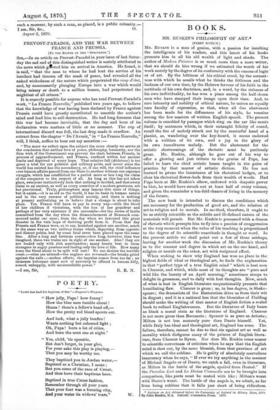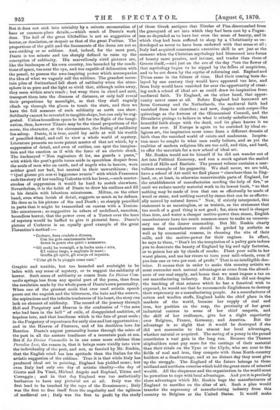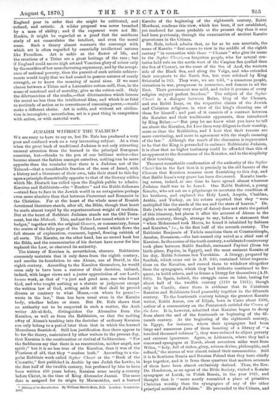BOOKS.
MR. RUSKIN'S PHILOSOPHY OF ART.* [FIRST NOTICE.] Mn. RUSKIN is a man of genius, with a passion for insulting the intelligence of his readers, and this latest of his books presents him in all his old wealth of light and shade. The author of Modern Painters is so much more than a mere writer, that we should do him wrong if we estimated the worth of his work merely by the degree of its conformity with the canons of logic' or of art. By the loftiness of his ethical creed, by the earnest- ness with which he assails what he thinks the littleness and the badness of our own time, by the Hebrew fervour of his faith in the certitude of his own doctrines, and, in a word, by the richness of his own individuality, he has won a place among the half-dozen men who have stamped their image upon their time. And, to rare intensity and nobility of ethical nature, he unites an equally rare faculty of expression, so that, when all due abatement has been made for the diffuseness of his style, he remains among the few masters of written English speech. The present
volume is ennobled by passages which ring on the ear like music itself; by sentences which, in their untaught felicity of sound, recall the fire of melody struck out by the masterful hand of a pianist, as, wandering over the key-board, it seems endowed with a volition of its own, and a joy in the glory of its own tumultuous melody. But the abatement for the artistic shortcomings of the rhetoric must be perilously great. Mr. Ruskin, although he goes out of his way to offer a glowing and just tribute to the genius of Pope, has failed to learn the chief artistic lesson taught in the guise of practice by that master of artistic diction. He has not learned to prune the luxuriance of his rhetorical hedges, or to clear his rhetorical flower-beds from their wealth of weeds. Had Pope been at Mr. Ruskin's elbow, endowed with despotic power to blot, he would have struck out at least half of every volume, and given the remainder a ten-fold chance of living in the memory of the future.
The new book is intended to discuss the conditions which are necessary for the production of good art, and the relation of art to religion and to morals. In method, therefore, it ought to be as strictly scientific as the subtile and ill-defined nature of the materials will permit. But Mr. Ruskin is possessed with a demon of rhetoric which prompts him to fly into a passion of exaggeration at the very moment when the value of his teaching is proportioned to the degree of its scientific exactitude in thought or word. In the present article we shall point out a few of these mishaps, leaving for another week the discussion of Mr. Ruskin's theory as to the manner and degree in which art on the one hand, and religion or morals on the other, act with reciprocal effect.
When seeking to show why England has won no place in the highest fields of ideal or theological art, he finds the explanation in that "perfect type of a true English mind" which is best seen in Chaucer, and which, while most of its thoughts are "pure and wild like the beauty of an April morning," sometimes stoops to delight in grossness, and to daily with foul thoughts. Now, much of what is best in English literature unquestionably presents that humiliating flaw. Chaucer is gross; so, in less degree, is Shake- speare; the dramatists of the Restoration drive us from their wit in disgust ; and it is a national loss that the blemishes of Fielding should make the writing of that master of English fiction a sealed book to refined Englishwomen. But the literature of Italy bears as black a moral stain as the literature of England. Chaucer is not more gross than Boccaccio ; Spencer is as pure as Ariosto ; Milton is not leas austerely pure than Dante himself. Yet, while Italy has ideal and theological art, England has none. The failure, therefore, cannot be due to that sin against art as well as morality which disfigures many of the princes of English litera- ture, front Chaucer to Byron. Nor does Mr. Ruskin come nearer to scientific correctness of criticism when he says that the English mind is shut out, by the same blemish, from that province of art
which we call the sublime. He is guilty of absolutely marvellous inaccuracy when he says, "If ever we try anything in the manner of Michael Angelo or of Dante, we catch a fall, even in literature, as Milton in the battle of the angels, spoiled from Hesiod." 11 the Paradise Lost and La Divina Commedia are to be brought into comparison, like parts must be mated with like ; Milton's worst with Dante's worst. The battle of the angels is, we admit, so far from being sublime that it falls just short of being ridiculous.
* Lectures on Art, delivered Wore The University of Oxford in Hilary Term, 1870. By John Buskin, M.A. Oxford: Clarendon Press. 1870. But it does not sink into triviality by a minute enumeration of base or common-place details,—which much of Dante's work does. The bell of the great Ghibelline is not so suggestive of horror, or desolation, or despair as that of the great Puritan. The proportions of the guilt and the lineaments of the doom are not so awe-striking or so sublime. And, indeed, for the most part, Dante is too minute and too sharply defined to raise up the conception of sublimity. His marvellously vivid pictures are, like the landscapes of his own country, too bounded by the condi- tions of apace, too near the eye, and too capable of delineation with
the pencil, to possess the awe-inspiring power which accompanies the idea of what we vaguely call the sublime. The grandest moun- tain piles of Switzerland fall short of sublimity when the atmo- sphere is so pure and the light so vivid that, although miles away, they seem within arm's reach ; but wrap them in cloud and mist, transport them into the dimness of distance, or only half reveal their proportions by moonlight, so that they shall vaguely climb up through the gloom to touch the stars, and then we have the full measure of such sublimity as earth can show.
Sublimity cannot be revealed in tangible shape, but can only be sug- gested. Unless boundless space be left for the flight of the imagi- nation, then, however Titanic may be the visual proportions of the scene, the character, or the circumstance, the feeling of sublimity lies asleep. Dante, it is true, could lay aside at will his wealth of pencilled detail, and call to view a whole world of mystery.
Literature presents no more potent master of that art which, by a suppression of detail, and even of outline, can spur the imagina- tion and the emotion as if with the force of an electric shock. The hackneyed "Non ragioniam di lor, ma guarda e passe," with which the poet's guide turns aside in speechless despair from the souls of men who on earth, and of angels who in heaven, were neither good nor bad, but neutral in their unworthiness ; the " Quel giorno pia non vi leggemmo avante" with which Francesca ends the story of her reading Galeotto with her lover,—such master- strokes of suppression it would be hard to match elsewhere. Nevertheless, it is the habit of Dante to draw his outlines and fill in his details with laborious minuteness. Milton, on the other hand, even when lavish of detail, suggests as much as he defines. He does so in his picture of Sin and Death ; so sharply pencilled in parts that it might be transcribed on canvas with a Teniers- like minuteness ; so suggestive in others of undefined, nameless, boundless horror, that the power even of a Turner over the hues of mystery would be baffled to give it pictorial form. Dante's picture of Cerberus is an equally good example of the great Florentine's method :—
.,Cerbero, flora crudele a diverse, Con tre gob e caninamente latra
Sovra la gente che quivi è sommersa.
"Gil occbj ha vermigli, e la barba nnta c atra, ventre largo, e nnghiate is mani : Grallla gli spirti, gli scnoja ed isquatra.
"Urlar gli fa la pioggia come cani."
Graphic and terrible, but too bounded and sunbright to be laden with any sense of mystery, or to suggest the sublimity of
horror. Such sense of sublimity as comes from La Divina Corn- media springs less from any special part of the poem, than from
the revelation made by the whole poem of Dante's own personality. When one of the greatest souls that ever used artistic speech pours out the anguish and the bitterness, the hate and the sorrow, the aspirations and the infinite tenderness of his heart, the story can lack no element of sublimity. The record of the journey through
Hell and Purgatory and Heaven is the confession of "the man who had been in the hell" of exile, of disappointed ambition, of hopeless love, and that loneliness which is the fate of great souls ; in the Purgatory of repentance for early sins and lost opportunities ; and in the Heaven of Florence, and of his deathless love for Beatrice. Dante's august personality looms through the mists of the past in all the austere loneliness of a mountain peak at sea. But if La Divina Commedia is in one sense more sublime than Paradise Lost, the reason is, that it brings more vividly into view the individuality of the poet, and not, as fancied by Mr. Ruskin, that the English mind has leas aptitude than the Italian for the
artistic suggestion of the sublime. True it is that while Italy has produced ideal art in painting, England has yielded none ; but even Italy had only one day of artistic ideality—the day of Giotto and Da Vinci, Michael Angelo and Raphael, Titian and Correggio ; and in that day England was too Eesthetically barbarous to have any pictorial art at all. Italy was the
first land to be touched by the rays of the Renaissance ; Italy was the first to free itself from the angularity and the ugliness of mediieval art ; Italy was the first to profit by the study
of those Greek antiques that Nicolas of Pisa disentombed from the graveyard of art into which they had been cast by a Pagan- ism so degraded as to have lost even the sense of beauty, and in which they had been suffered to sleep by a Christianity so un- developed as never to have been endowed with that sense at all ; Italy had acquired consummate executive skill in art just at the moment when the Christian mythology had blossomed into forms of beauty more pensive, and intense, and tender than those of Greece itself,—and just on the eve of the day ":hen the flower of that mythology began to be nipped by the frXsts of scepticism, and to be cut down by the scythe of reforming zeal. Raphael and Titian came in the fulness of time. Had their coming been de- layed by one century they would have appeared too late, and from Italy would have vanished for ever the opportunity of creat- ing such a school of ideal art as could draw its inspiration from medimval faith. To England, on the other hand, that oppor- tunity never came at all. Before England had borrowed art from Germany and the Netherlands, the medimval faith had vanished from her churches ; and now, despite such corpse-like quiverings as the fervour of the (Ecumenical Council, and the Ritualistic pinings to believe in what is utterly unbelievable, that beautiful faith sleeps with the dead, and its place knows it no more for ever. If Europe is again to be enriched by ideal re- ligious art, the inspiration must come from a different domain of faith than the vanished world of saints and madonnas. Inspira- tion must be sought in what men really believe, and as yet the realities of modern religious life are too cold, and thin, and hard, to offer the materials for a new school of ideal art.
Mr. Ruskin would not be himself if he did not wander out of Art into Political Economy, and run a muck against the mailed crowd of Mills and Bastiats. The present volume contains a mar- vellous example of his pugnacity. We shall never, we are told, have a school of Art until we find places "elsewhere than in Eng- land, or, at least, in otherwise unserviceable parts of England, for the establishment of manufactories needing the help of fire," or until we reduce merely material work to its lowest limit, "so that nothing may be made of iron that can as effectually be made of wood or stone, and nothing moved by steam that can be as effectu- ally moved by natural forces." Now, if strictly interpreted, this statement is as meaningless, or as truistic, as the statement that too much of a good thing is not good ; for, since wood is cheaper than iron, and water a cheaper motive-power than steam, English manufacturers have too much common-sense to make an unneces- sary use of the dearer commodity. But Mr. Ruskin clearly means that manufacturers should be guided by mstbetic as well as by commercial reasons, in choosing the site of their mills, and the motive-power for their engines. In effect, he says to them, "Don't let the temptation of a paltry gain induce you to desecrate the beauty of England by big and ugly factories, or to poison her air by clouds of smoke. Plant your mills in her worst places, and use her rivers to turn your mill-wheels, even if you lose one or two per cent, of profit." That is an intelligible doc- trine. It means that in order to make this country artistic we must surrender such natural advantages as come from the abund- ance of our coal supply, and hence that we must impose a tax on our manufacturing industry. But if Mr. Ruskin did not despise the teaching of that science which he has a fanatical wish to expound, he would see that he recommends Englishmen to destroy their supremacy as a manufacturing people. As a manufacturer of cotton and woollen stuffs, England holds the chief place in the markets of the world, because her supply of coal and iron, her position on the map, the proximity of her great industrial centres to some of her chief seaports, and the skill of her craftsmen, give her a slight superiority over Belgium, France, Germany, and America. But the advantage is so alight that it would be destroyed if she did not economize to the utmost her local advantages, whether natural or acquired. The saving of a penny in the pound constitutes a vast gain in the long run. Because the Thames shipbuilders must pay more for the carriage of their material than their rivals on the Tyne or the Clyde, who are near to the fields of coal and iron, they compete with those North-country builders at a disadvantage, and at no distant day they must give up the struggle. The England of the future belongs to those midland and northern counties which hold the great store of mineral wealth. All the eloquence and the organization in the world must be powerless to cope with local advantages. And yet it is precisely those advantages which Mr. Ruskin begs the manufacturers of England to sacrifice on the altar of art. Such a plan would transfer the supremacy of manufacturing industry from this country to Belgium or the United States. It would make England poor in order that she might be cultivated, and -refined, and artistic. A wilder proposal was never broached by a man of ability ; and if the exponent were not Mr. Ruskin, it might be regarded as a proof that the assiduous study of art emasculates the intellect, and even the moral sense. Such a theory almost warrants the contempt with which art is often regarded by essentially intellectual natures like Proudhon. Art is noble as the flower of life, and the creations of a Titian are a great heritage of the race ; but if England could secure high art and Venetian glory of colour only by the sacrifice of her manufacturing supremacy, and by the accept- ance of national poverty, then the pursuit of such artistic achieve- ments would imply that we had ceased to possess natures of manly strength, or to know the meaning of moral aims. If we must choose between a Titian and a Lancashire cotton-mill, then, in the name of manhood and of morality, give us the cotton-mill. Only the dilettanteism of the studio,—that dilettanteism which loosens the moral no less than the intellectual fibre, and which is as fatal to rectitude of action as to correctness of reasoning power,—would make a different choice. Art is noble, and without art civiliza- tion is incomplete ; nevertheless, art is a poor thing in comparison with action, or with material work.
































 Previous page
Previous page